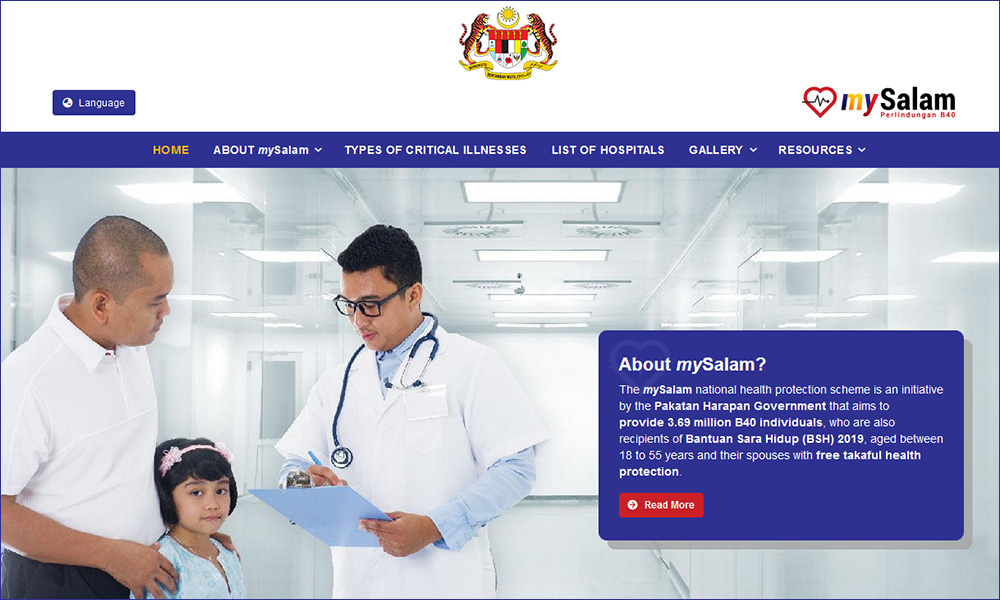LETTER | The Ministry of Health claims it is committed to universal health coverage. According to the World Health Organisation, universal health coverage means the role of a government to provide healthcare and financial protection for its citizens.
Further it means that all people have access to the quality health services they need, when they need and where they need, without financial hardship. Universal Health Care encompasses access of healthcare for all Malaysians.
Yet, the MySalam Scheme which aims to “provide national health protection for B40 individuals under the Bantuan Sara Hidup (BSH) has two serious exclusions. This Scheme is for the B40, the bottom 40, yet two significant groups of people who are under this group do not qualify for the benefits of the MySalam Scheme.
Firstly, the B40 consumer should not be diagnosed for the disease before Jan 1, 2019. Thus if he has been suffering for many years, he will be excluded. Only those who are diagnosed after Jan 1, 2019, are allowed to benefit from the MySalam.
Secondly, the scheme is only for those aged between 18 and 55. Thus, if the B40 consumer is above the age of 55, he would be excluded. It cannot be denied that the older we get, the more we are prone to various diseases and health problems. Yet, the sick who are also poor, over the age of 55 are excluded.
In summary, the person to qualify for MySalam must be diagnosed after Jan 1, 2019. Previous diseases are excluded. The person must be less than 55 years. Older patients are excluded.
This would typically be a scheme run by insurance companies, where there is a critical consideration of the “risk” of the individual. Those who already have pre-conditions are excluded. Those considered “high” risk either because of age or other factors pay higher premiums or are excluded completely.
Thus, the insurance company provides coverage only for those of “low risk”. High risk consumers are penalised or excluded. This way the company can minimise paying for claims and maximise shareholder value. This is the modus operandi for a company for which the primary objectives are profits and maximising shareholder value.
The government does not act in a manner to maximise profits, rather it acts to maximise services and well-being of the rakyat. Or at the very least, that is what it should be doing.

Unfortunately, our government is acting as an insurance company – excluding those who need help the most and those who are aged. The Ministry of Health is certainly not practising Universal Health Coverage.
The MySalam website indicates that the MySalam Scheme is managed by an insurance company. Thus, it is certainly not surprising that their typical exclusion policies of an insurance company are being implemented in MySalam, although the scheme is targeted to help the poor.
Healthcare programmes must be managed by the government. This will ensure true Universal Health Coverage. The focus then would be service for all and not excluding “risky” consumers.
Contributions by insurance companies or any other private company should certainly be encouraged. However, if they are genuine, their contribution should be towards increasing public health expenditure. The current public healthcare expenditure of about two percent of the GDP is certainly too low.
This low expenditure is resulting in overcrowding in government hospitals, long waits to meet the specialists, shortage of beds and sometimes lack of medicines. With the increase in non-communicable diseases, the government certainly could use the funds from the private sector to provide better healthcare for all, but especially the poor.
Receiving funds to serve the rakyat is certainly welcome. However, the government must manage these resources and keep to its commitment to universal health coverage. The danger is if you allow private companies to manage healthcare, they will take into account the “risks” of consumers, and we may end up with public hospitals which will not allow sick, aged or vulnerable people to seek treatment.
MySalam is a classic example of what happens when you allow a private company to run a healthcare programme. It is indeed shocking! Instead of the government forcing the company to provide healthcare for all (an inclusive policy), the private company instead has succeeded in forcing the government to provide healthcare only for those it deems worth the risk (exclusive policy). It appears that insurance company policies have prevailed over the role of the government.
PAUL SELVA RAJ is the chief executive officer of the Federation of Malaysian Consumers Associations (Fomca).
The views expressed here are those of the author/contributor and do not necessarily represent the views of Malaysiakini.

